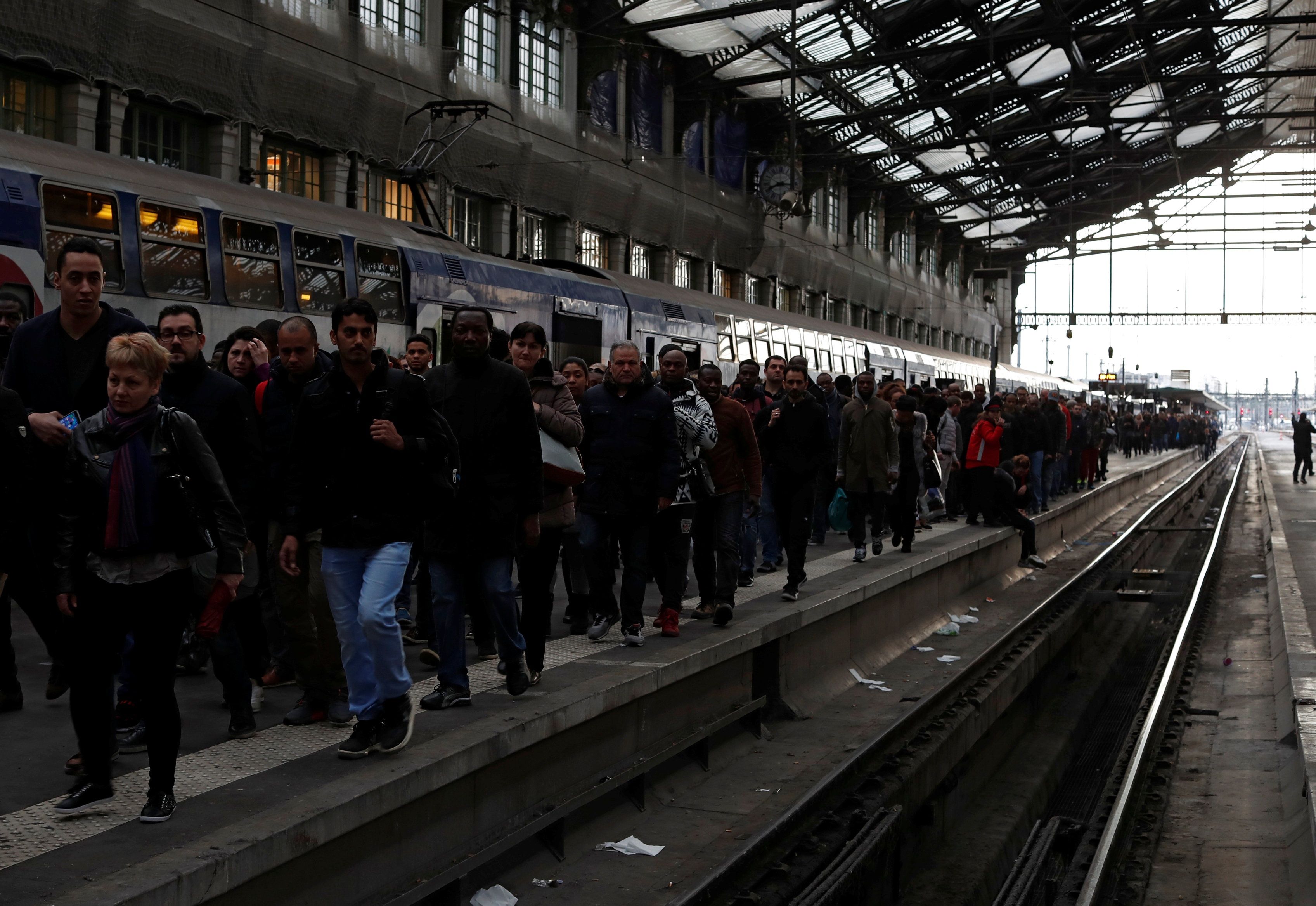Tens of thousands of public sector workers and students, led by the National Society of French Railways' (SNCF) staff, went on strike Tuesday to protest a series of labor reforms proposed by President Emmanuel Macron. The protest according to estimates could be the largest France has seen in decades.
RELATED:
In a series of protests, labeled by French media as “Black Tuesday” (Mardi Noire in French), railroad workers are demanding Macron backtrack on his proposed reforms, which directly affect the state-owned SNCF and its employees.
The railway workers have pledged to strike for two out of five days until the end of June if they can't come to an agreement with the government.
Protesters fear that Macron's intentions to overhaul the SNCF and turn it into a publicly listed company may lead to its eventual privatization, something the government has denied.
Prime Minister Édouard Philippe said the reform proposals are needed to change a situation that is “no longer tenable,” and called for strikers to respect “the millions of French people who want to go to work because they have no choice because they want to go to work.”
#Now | Thousands of students and public sector workers protest in Paris today over a series of controversial reforms pushed forward by French president @EmmanuelMacron #JesoutienslesCheminots #grevesncf #JeSoutiensLaGreveDesCheminots pic.twitter.com/wr1xfpkavG
— teleSUR English (@telesurenglish) 3 de abril de 2018
Macron's government argues the SNCF massive debt is holding it back, and that the state-owned company needs restructuring so it can compete against private services entering the competition during the next year under EU rules.
The reforms include cuts on railway workers rights, removing the life-long job contracts, annual pay rises, and early retirement provisions, to deal with the company's financial issues.
But protesters believe that giving in to the reforms would mean the first step towards privatization and decreasing working conditions for all.
“We’re defending the French public service, not just rail workers,” said Emmanuel Grondein, head of Sud Rail, one of the unions backing the strikes.
It's believed that about 77 percent of SNCF drivers and 34 of its overall personnel are on strike, leaving train transportation operations at the minimum capacity.

At Gare du Nord, Paris's busiest station, platforms were so crowded that some commuters fell onto the tracks. Other stations were plunged into darkness as the lights and ticket machines switched off.
Outside Gare de L'Est, crowds of SNCF workers denounced the government and set off flares that filled the area with smoke.
RELATED:
Only about one in five regional trains and one in eight TGV (high-speed trains) are currently in operation, causing major traffic problems, overcrowded transportation services, and discontent among some commuters.
"I do understand why they're striking," said Marie Charles, a Paris commuter. "But today is my first day in a new job so I have to admit I could have done without the strike."
The Eurostar international train services are working at about 75 percent of its capacities, suspending its connections to Spain, Switzerland, and Italy, while maintaining services to Belgium, the Netherlands, Germany, and London with limited capacity.
The lack of transportation has increased traffic on the road, with about 420 kilometers of jams at the morning's rush hour near Paris.
But others have decided to join the general strike in support of workers' rights, which could face tough times ahead of a neoliberal-oriented government, reminding of the 1968 mass protests in France and around the world or the 1995 general strike also led by the SNCF.
#FRANCIA Más del 70% de los trabajadores ferroviarias han respaldado la huelga en rechazo al nuevo Código de Trabajo y las liberalizaciones, entre ellas la de la SNCF #GrèveSNCF pic.twitter.com/lxbr4jvAeb
— Sergio Rodrigo (@SRodrigoteleSUR) 3 de abril de 2018
“More than 70 percent of railroad workers are backing the strike against the new Labor Law and liberalizations, the SNCF among them.”
Students and unions alike are joining the protests in the hope that the government backtracks on Macron's proposed neoliberal policies, including education reform, but the government hopes the strikes to cause more anger than sympathy among those who are immediately affected by the industrial action, eventually leading to victory for the government.
“We need to rid this country of its strike culture,” said on Monday Gabriel Attal, a spokesman for Macron’s party, La Republique En Marche.
Unions of Air France, the French flagship carrier and founding member of SkyTeam, also went on strike Tuesday to demand a 6 percent pay rise that has been rejected by the management.
The airline is estimated to be operating about 75 percent of its flights, with no more than 32 percent of its pilots, 20 percent of cabin crew and 15 percent of ground staff joining the strike.
About 67 percent of its medium-haul flights would operate and 85 percent of short-haul ones.
Further strike days have been programmed for April 7, 10 and 11.
Unions are also calling on trash collectors to join the protests and organize a national collection service association to fight for better working conditions and benefits.
Energy workers have reportedly also joined the protests to demand an end to Macron's calls for reforms and liberalization of the energy market.
The unions are broadly weaker now and divided over how best to handle Macron's many social and economic reforms -- a division Macron hopes to be able to exploit to his advantage.
If the 40-year-old president succeeds, it will set the tone for other reform plans, including revamping the education system and overhauling pensions. Macron has already faced down the unions to ease labor laws, making it simpler to hire and fire.